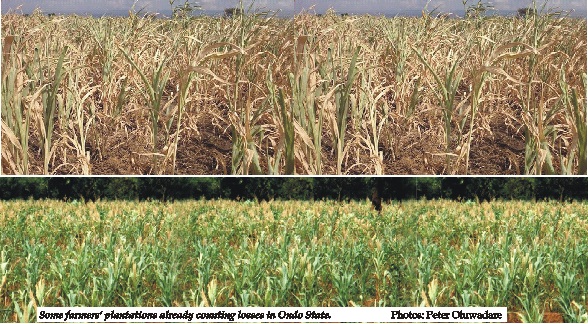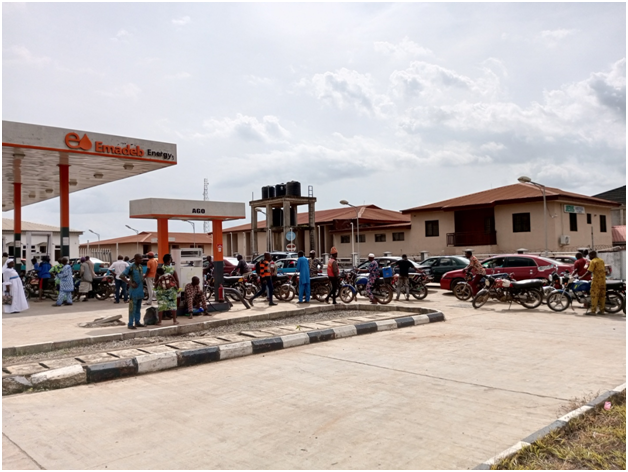Climate change: Food crisis looms – Experts warn

By Fatima Muraina
|
Meteorologsts have raised the red flag over what they described as looming food crisis in the country due to climate change in form of irregular rainfall.
The weather experts attributed the likely food crisis to long drought, late onset of rainfall, insecurity and poor food production.
According to them, over 50 million people in West Africa and the Sahel region may experience food crisis between June and October this year, if appropriate measures are not quickly taken.
The meteorologists who made this known in separate interviews with The Hope are Prof. Ahmed Balogun from the Department of Meteorology and Climate Science, Federal University of Technology, Akure, (FUTA), and Dr. Abdou Ali.
The experts called for adaptation of irrigation farming rather than rely on rain fed agriculture to boost food production.
Balogun described the long break in rainfall as experienced in the past three weeks when several crops withered off as signatures of climate variabilities and change, adding that several warnings had earlier been given against early planting so as to avoid labour loss.
“The warning had been given by the Weather and Climate Science authorities. All we can say is that this thing is not new it happened in 2020 and 2021 and now is happening again. This is just saying that the climate has changed and it is not a matter for debate anymore.
“What we should now do is to adapt to this uncertainty which we have not been doing because we are used to “rain will come in April and May”. Now, the uncertainty is too high, imagine four weeks without rain, all the seedlings have dried off.
“This also opens up opportunities for investment in adaptation strategy like irrigation at the dry season. In all the dry season, from December till March, we just fold our hands, whereas in other places they are using irrigation to produce foods.
“So, there will be shortage of food because we have not adapted to the system by taking necessary precautions. Now, if we start investing in irrigation the issue of no food cannot happen. We have only depended on rain fed agriculture, what this is telling us now is that, that is in the past, and we cannot sustainably depend on rain fed agriculture now under this regime of climate nature.
” We need to start investing in irrigation and other climate nature adaptation, efficiently utilizing water and reservation of water. That is it. We keep doing things that are altering this natural system, we are deforesting, not planting trees back, we are drilling boreholes up and down without planning. All these are affecting the climatological cycle. We continue to emit out gases, we waste energy, So these are the issues.
“The bottom line is that we should stop over dependent on natural system like rain fed agricultural system, that era is gone. And we have been saying this for more than 10years and people have not been taking it serious.
“So government should support people now with funding, particularly farmers. What we are saying is that government should put infrastructure on ground that allows people to afford technology.
Maybe at the local government level, at the ministry level, there should be opportunity for people to access resources to allow them manage their small farms.
“Everybody is now doing homestead and small, small farming up and down. And even if you engage in large scale farming, yearly, you can have a well there and get pump to irrigate it, you will maximize it for years but now everything is depending on rain and the rain is not coming.
“The normal planting season is in May. By the time we get into May and we have three consecutive rains then we are good to go, then you can confidently say that the rain has started”, Prof Balogun emphasised.
One his part, Dr. Ali, who explained that over 50 million people in West Africa and the Sahel region may experience food crisis between June and October this year, however, said the crisis could be averted if countries in the region changed their food production system.
“We have many problems in the region: insecurity and bad food production. We are currently not in the rainy seasons. We, however, have a tool that assesses the number of people under a food crisis.
“According to the analysis by the Permanent Interstate Committee for Drought Control in the Sahel (CILSS) and its partners, a very large number of people will be in a food crisis in the region from June to October, if appropriate measures are not taken.
“We have made an assessment, and for this year, we have a very large number of people that would be affected, compared to last year where about 37 million people were affected in the region.
“This year, more than 50 million people will be in a food crisis in the region during the upcoming lean season from June to October, if appropriate measures are not taken to manage the situations”, Ali added.
To prevent the looming food crisis, he said: “Each country needs to mobilise funds, activate contingency plans, call for assistance from partners and provide food, where necessary, to manage the crisis.
The Chairman of Farmers Congress in Akure North local government, Tayo Abiodun, recalled that farmers had earlier been warned against early farming as he said that those who farmed earlier than now are the counting losses.
He noted that farming proper would be as from first week of May when planted crops can withstand the climate situation in readiness of rainfall.
Abiodun disclosed that farmers may not be able to meet the expectation of production boost as they do not have such capacity due to the economic situation and the high cost of goods and services.
” We cannot engage the services of labourers, they are not easily found because their charges are beyond reach”, he said.
He added that commercial farmers could not also produce at commercial rate too because they cannot afford to hire tractors, just as he called on government at all levels and relevant stakeholders to help in providing tractors at highly subsidized rate to boost food production.












